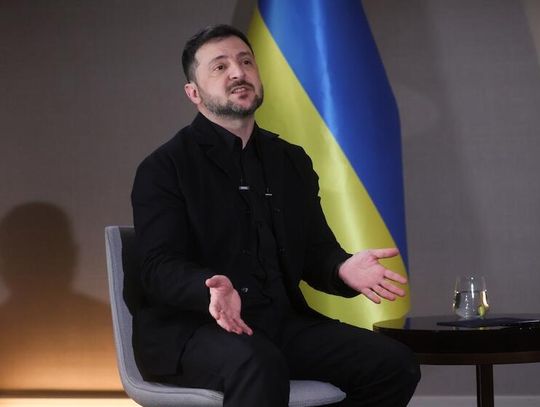Nasilają się postawy ekstremistyczne w Izraelu
Partia Likud byłego premiera Benjamina Netanjahu wygrała 1 listopada wybory parlamentarne w Izraelu. Oznacza to tym samym, że Netanjahu obejmie szóstą kadencję w fotelu szefa rządu.
Jego partia zdobyła 65 mandatów potrzebnych do uzyskania większości w 120-osobowym Knesecie. Koalicja rządząca prawdopodobnie będzie składać się z kilku partii prawicowych. Można więc spodziewać się nasilonych represji wobec ludności palestyńskiej zamieszkującej okupowany przez Izrael Zachodni Brzeg.
Głosowanie w Izraelu odbyło się na krótko przed wyborami do Kongresu USA, które odbyły się 8 listopada. Warto zadać sobie pytanie, jak przetasowania na samym szczycie wpłyną na przyszłe stosunki między Izraelem i USA.
Okres przedwyborczy był jednocześnie czasem destabilizacji na Zachodnim Brzegu, gdzie doszło do wzrostu ataków, co wzbudziło uzasadnione obawy ludności palestyńskiej przed konsekwencjami ekstremistycznej polityki Netanjahu. Analitycy zgodnie twierdzą, że oddala się perspektywa utworzenia niepodległego państwa palestyńskiego. Władze w Waszyngtonie stoją przed nie lada wyzwaniem – jak ułożyć stosunki z Izraelem, którego rząd forsuje niekorzystną dla interesów USA politykę. Poważnym kandydatem na stanowisko ministra bezpieczeństwa jest Itamar Ben-Gewir, lider skrajnie prawicowej partii Żydowska Siła, skazany w 2007 r. za podżeganie do rasizmu. Jako szef tego resortu, Ben-Gewir zyskałby bezpośredni nadzór nad izraelskimi służbami, a także miałby wpływ na politykę państwa w kwestii miejsc kultu w Jerozolimie. Inny prawicowy polityk, Becalel Smotricz, również nie ukrywa swojej niechęci do izraelskich Arabów. Nominacja obydwu kontrowersyjnych polityków na prominentne stanowiska w nowym gabinecie Netanjahu położyłaby się cieniem na stosunki Izraela nie tylko z USA, ale także ze Zjednoczonymi Emiratami Arabskimi.
W tym kontekście warto wspomnieć, że w ubiegłym tygodniu wybory prezydenckie w Brazylii wygrał lewicowy polityk Luiz Inácio „Lula” da Silva, który w przeszłości piastował już najwyższy urząd w tym kraju. Zarówno Lula, jak i Netanjahu odzyskali władzę w swoich krajach. Ustrój polityczny państw Ameryki Południowej cechuje się jednak progresywnym podejściem, w którym zwalcza się wszelkie przejawy imperializmu. Inaczej kwestia ta ma się w Europie, gdzie można dostrzec pewne podobieństwa zarówno po prawej, jak i lewej stronie sceny politycznej. Przykładem są chociażby dążenia ekstremistyczne czy podporządkowanie sobie mniejszości narodowych.
Wzrost znaczenia partii populistycznych i ekstremistycznych może zachwiać podstawami demokratycznego państwa prawa. Faktem jest, że zarówno Lula, jak i Netanjahu mierzą się z oskarżeniami o korupcję, defraudację i nadużycie zaufania. Stosunki na linii USA-Izrael wyklarują się na krótko po wyborach połówkowych do Kongresu. Oczekuje się także, że po kilku miesiącach politycznego niebytu do wielkiej polityki powrócić może były prezydent USA Donald Trump.
Powrót Netanjahu może zachwiać istniejącym porządkiem konstytucyjnym Izraela, czyli de facto podstawami ustroju demokratycznego państwa. Jego partia wielokrotnie wprowadzała niekorzystne zmiany w systemie sądownictwa, łamała prawa ludności palestyńskiej na Zachodnim Brzegu i realizowała konserwatywny program polityczny. Możliwe, że władze Izraela spotkają się ze stanowczą odpowiedzią społeczności międzynarodowej.
Izrael nie zrewiduje swojego zachowawczego stanowiska wobec rosyjskiej agresji na Ukrainę. Izraelskie władze udzieliły politycznego poparcia Ukrainie, koncentrują się na pomocy humanitarnej i wsparciu ludności żydowskiej, ale unikają bezpośredniego potępiania Rosji. Minister obrony Benny Gantz zapowiedział, że Izrael nie wyśle broni na Ukrainę. Nawet gdy rosyjskie wojska zaatakowały cele ukraińskie przy użyciu irańskich pocisków, Izrael opowiedział się za współpracą z Moskwą w Syrii i zagwarantował bezpieczeństwo rosyjskim Żydom. Neutralne stanowisko Izraela nie podoba się jego sojusznikom.
Mimo to Izrael ma szansę stać się kluczowym graczem na rynku energetycznym – na początku miesiąca władze zwaśnionych ze sobą Izraela i Libanu zawarły porozumienie dotyczące ustalenia granicy na Morzu Śródziemnym. Tym samym Izrael będzie mógł uruchomić wydobycie gazu ze złoża Karisz. W styczniu 2020 r. Izrael, Cypr i Grecja podpisały porozumienie w sprawie budowy śródziemnomorskiego gazociągu EastMed, który początkowo cieszył się wsparciem Amerykanów.
Katja-Elisabeth Herrmann
odbywa staż jako pracownik naukowy w Warsaw Institute. Posiada wykształcenie w dziedzinie spraw transatlantyckich nabyte w College of Europe (Warszawa) oraz Fletcher School of Law and Diplomacy na Tufts University. Ponadto Katja-Elisabeth posiada tytuł licencjata stosunków międzynarodowych i organizacji międzynarodowych, który połączyła z dyplomem z prawa międzynarodowego i europejskiego na Uniwersytecie w Groningen. Podczas studiów licencjackich jej głównym celem było zbadanie powiązania technologii i prawa w Unii Europejskiej. Niedawno otrzymała stypendium na rzecz polityki publicznej Fundacji Squire Patton Boggs w 2022 roku. W jej pracy w ramach programu stypendialnego jej badania poświęcone są istotnym tematom zainteresowania sprawami transatlantyckimi z perspektywy prawnej i politycznej.
Niniejszy artykuł powstał w ramach działalności społeczno-misyjnej polskiego think tanku Warsaw Institute. Jeśli cenicie Państwo przygotowane przez naszych ekspertów treści, apelujemy o wsparcie finansowe naszej działalności realizowanej na zasadzie non-profit. Do regularnych darczyńców przysyłamy bezpłatnie anglojęzyczny kwartalnik The Warsaw Institute Review.Więcej informacji: www.warsawinstitute.org/support/Darowizny można dokonać bezpośrednio na konta bankowe:USD: PL 82 1020 4900 0000 8502 3060 4017EUR: PL 85 1020 4900 0000 8902 3063 7814GBP: PL 18 1020 4900 0000 8302 3069 6641PLN : PL 41 1020 1097 0000 7202 0268 6152SWIFT: BPKOPLPWDziękujemy!
Warsaw Institute to polski think tank zajmujący się geopolityką. Główne obszary badawcze to stosunki międzynarodowe, bezpieczeństwo energetyczne oraz obronność. Warsaw Institute wspiera Inicjatywę Trójmorza oraz stosunki transatlantyckie.
Warsaw Institute is a Polish think tank focusing on geopolitics. The main research areas are international relations, energy security and defense. The Warsaw Institute supports the Three Seas Initiative and transatlantic relations.
The return of Netanyahu - the possible comeback of regional tensions and the resurrection of extremist politics
Benjamin Netanyahu, the former and current prime minister of Israel secured his sixth term as primer minister after the Knesset (Israeli Parliament) elections on the 1st of November 2022. The Likud party leader’s bloc was set to win a comfortable majority of 65 out of the required 60 seats in the 120-seat Knesset. As the current political arrangements form, the envisaged coalition is expected to be a much more unified right-wing coalition composed of a smaller number of parties easier to hold together. Conclusively, this coalition is expected to enact a dissonant crackdown on Palestinians in the occupied West Bank.
For the U.S. these developments certainly come at a measured time,e just a few days before the midterm elections. Amidst the U.S. midterm elections scheduled for November 8, 2022, raising questions on U.S. foreign policy and the future of the U.S.-Israeli relationship could bring back on the spotlight the long-standing history between Netanyahu and President Joe Biden.
During the days prior to the elections, Palestinian cities in the occupied West Bank were under siege on repeated occasions, fuelling the fear of its citizens and the rising consequences of the return of a less deferential political government. According to experienced analysts, “the prospects for an independent and viable Palestinian state seems less likely than ever.”1 In this context, the rising concern that dominates the political discourse among US officials is how best to work with Israel when the government proposes a political agenda that might result in extremism and be unfavourable to U.S. interests in the region. For instance, Itamar Ben-Gvir, one of the right-wing party leathers of the Religious Zionist Party (RZP) “who was convicted in 2007 of supporting a terror organization and inciting racism”2 is proposing his name for the Ministry of Internal Security. Accordingly, said position would allow him to be in direct control of the Israeli police and policies around Jerusalem's holy sites. Similarly, Bezalel Smotrich (RZP) has not uncovered his repeated hostility toward Israeli Arabs, setting into question the uniformity of Israeli democracy. Indeed, the inclusion of Smotrich and Ben Gvir within Netanyahu's new cabinet would affect not only affect U.S.-Israel relations but also it is widely expected to affect also relations with the Emirates.
Similarly, in Brazil, former Brazilian President Luiz Inácio “Lula” da Silva enters back to lead Brazil after defeating Jair Bolsonaro during the presidential elections last week. Both soon-to-be Brazilian President “Lula” da Silva and Benjamin Netanyahu have managed to reconquer the strings of power in their respective countries. In Latinamerica, far-left political arrangements are renowned for being progressist with a tendency to lean towards extremist politics of anti-imperialism and social liberalism. However, such tendencies differ from their European counterpart categories and labels as
denominating them right or left do not disregard the numerous elements of convergence. For instance, maintaining an extremist posture and disregarding the opposition, endangering the balance of power and subjugating domestic minorities.
In addition to these considerations, important to highlight is that the rise of extremist parties presupposes a major challenge to democracy and the balance of power. Reality does not lies and the fact that both prospective leaders have faced trials for corruption, bribery, fraud and breach of trust. Indeed the future relationship between the U.S. and Israel will be determined in the following days or weeks as the midterm elections are over. Certainly, it is expected that former president Donald Trump to come back to the scene after standing in the dark for the past months.
In Israel, the political comeback of Netanyahu might fundamentally entail an alteration of the existing constitutional order that serves as the foundation for Israeli democracy. By challenging the judiciary, repeatedly crushing fundamental rights in the neighbouring regions of the West Bank and pursuing an extremely conservative agenda, Israel might encounter forced political stability internally with a hint of major strife externally.
In this context, the position of Israel vis-a-vis Ukraine is not expected to change. On repeated occasions, Israel has denounced Russian aggression to Ukraine however, it has maintained a policy of non-military intervention in the war, as expressed by Defence Minister Benny Gantz saying Israel was firm on not supplying Kyiv with weapons. Even after the employment of Iranian-based missiles by Russian forces, Israel directs its political will “citing a desire for continued cooperation with Moscow over war-ravaged neighbour Syria and to ensure the wellbeing of Russia's Jews.”3 Certainly, this posture is viewed with opposing eyes by Israel's partners.
Notwithstanding, Israel is likely to become a key actor in the upcoming months as its role increases in energy-related initiatives after signing an agreement with Lebanon, earlier this month, over their maritime border. If successful, “Israel’s ability to produce natural gas from the Karish field provides some much-needed positive news for energy markets.”4 Consequently, the EastMed gas pipeline scheduled between Israel and Greece passing through Cyprus, signed back in January 2022, is expected to reinvigorate American U.S.
Katja-Elisabeth Herrmannworks as a research fellow at the Warsaw Institute. She has a background in Transatlantic Affairs from the College of Europe (Warsaw, Poland) and the Fletcher School of Law and Diplomacy at Tufts University. Additionally, Katja-Elisabeth holds a BA in International Relations and International Organizations which she combined with a degree in International and European Law from the University of Groningen. During her undergraduate studies, her main focus explored the nexus between technology and law in the European Union. She has recently been awarded the Squire Patton Boggs Foundation public policy fellowship in 2022. As part of her work under the fellowship program, her research is devoted to relevant topics of transatlantic affairs interest from a legal and political perspective.
Sources
Bradstock Felicity, “The Israel-Lebanon Agreement Could Be A Game Changer For Natural Gas Markets” Oil Price (October 26, 2022) Available at:
<https://oilprice.com/Energy/Natural-Gas/The-Israel-Lebanon-Agreement-Could-Be-A-Game-Changer-For-Natural-Gas-Markets.html> Accessed November 2022.
Collinson Stephen, “In Brazil and Israel, leaders show Trump there can be political next acts” CNN (November 2, 2022) Available at:
<https://edition.cnn.com/2022/11/02/politics/trump-lula-da-silva-netanyahu-second-political-acts/index.html> Accessed November 2022.
Confino Jotam and Maureen Groppe, “More of a wild card': What a Netanyahu comeback could mean for US-Israeli relations” US Today News (October 26, 2022) Available at: <https://eu.usatoday.com/story/news/politics/2022/10/26/former-israeli-prime-minister-benjamin-netanyahu-biden/10562907002/> Accessed November 2022.
Guyer Jonathan, “Netanyahu and the far right have triumphed. Here’s what it means for Israel” VOX (November 2, 2022) Available at: <https://www.vox.com/2022/11/2/23437462/israel-elections-benjamin-netanyahu-coalition-explained> Accessed November 2022.
Ravid, Barak “Scoop: U.S. unlikely to work with Jewish supremacist expected to be made Israeli minister” Axios (November 2, 2022) Available at: <https://www.axios.com/2022/11/02/israel-elections-ben-gvir-netanyahu-biden-administration> Accessed November 2022.
Rose Emily, “Israel offers help with air-attack alerts, but Ukraine wants interceptors” Reuters (October 19, 2022) Available at:
<https://www.reuters.com/world/israel-edges-toward-air-defence-assistance-ukraine-2022-10-19/> Accessed November 2022.
Ross Dennis, David Makovsky, “A Narrow Government with Ben Gvir and Smotrich Threatens US-Israel Ties” Times of Israel (November 2, 2022) Available at: <https://www.washingtoninstitute.org/policy-analysis/narrow-government-ben-gvir-and-smotrich-threatens-us-israel-ties> Accessed November 2022.
1Jonathan Guyer, “Netanyahu and the far right have triumphed. Here’s what it means for Israel” VOX (November 2, 2022) Available at: <https://www.vox.com/2022/11/2/23437462/israel-elections-benjamin-netanyahu-coalition-explained> Accessed November 2022.
2Ravid, Barak “Scoop: U.S. unlikely to work with Jewish supremacist expected to be made Israeli minister” Axios (November 2, 2022) Available at: <https://www.axios.com/2022/11/02/israel-elections-ben-gvir-netanyahu-biden-administration> Accessed November 2022.
3Emily Rose, “Israel offers help with air-attack alerts, but Ukraine wants interceptors” Reuters (October 19, 2022) Available at:
<https://www.reuters.com/world/israel-edges-toward-air-defence-assistance-ukraine-2022-10-19/> Accessed November 2022.
4Felicity Bradstock, “The Israel-Lebanon Agreement Could Be A Game Changer For Natural Gas Markets” Oil Price (October 26, 2022) Available at:
<https://oilprice.com/Energy/Natural-Gas/The-Israel-Lebanon-Agreement-Could-Be-A-Game-Changer-For-Natural-Gas-Markets.html> Accessed November 2022.










